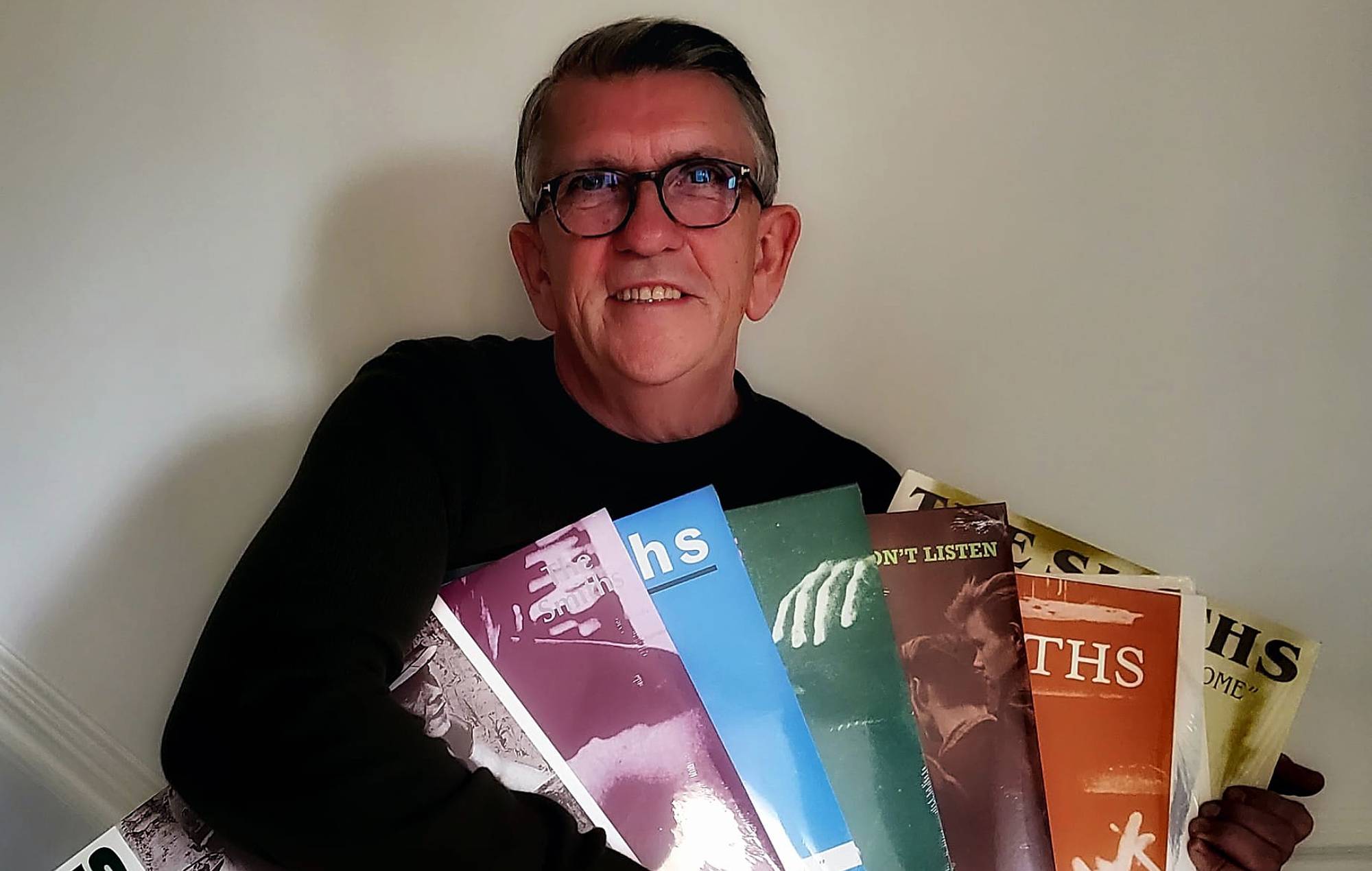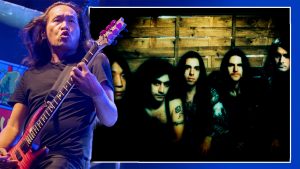The Smiths‘ drummer Mike Joyce has spoken to NME about ending his decades-long feud with Johnny Marr, as well as the recent reunion row and plans for a mural in memory of late bassist Andy Rourke.
READ MORE: The Smiths: every song ranked in order of greatness
The pair hadn’t spoken since Joyce sued Marr and Morrissey in 1996 over The Smiths’ royalties. The drummer won the case and was awarded £1million damages.
Now, Joyce has told NME he met Marr at a private service in Manchester back in May to mark a year since the death of Andy Rourke from pancreatic cancer.
“I’d seen Johnny at Manchester City games and we’d keep it civil, but there’d be no conversation,” said Joyce. “I knew Johnny was going to be at Andy’s service and I thought: ‘This isn’t about me or Johnny, it’s nothing other than Andy’. With that in mind, I was quite comfortable about seeing Johnny. It wasn’t tough when I saw him, it was just unusual, as I hadn’t spoken properly to Johnny for years and years. But we had a good chat there.”
By coincidence, Joyce and Marr met again at a Man City game less than a week later – thanks to Noel Gallagher. As part of the celebrations, the club invited Joyce and Gallagher to appear pitch-side. “As Noel came out, I saw he had Johnny with him,” recalled Joyce. “I told Johnny: ‘Alright, mate, we’ll have to stop meeting like this’. After not seeing each other in such a long time, the second one was just funny. We’ve said to keep it civil about things and businesslike in business. That’ll do for me.”
Johnny Marr, Morrissey, Mike Joyce and Andy Rourke of The Smiths, 1985. (Photo by Ross Marino/Getty Images)
Joyce was speaking to promote the mural he has crowdfunded of Rourke, which is being painted by renowned mural artist Akse at The Wheatsheaf pub in Manchester’s Northern Quarter. It will be unveiled on November 21 – Pancreatic Cancer Awareness Day, during Pancreatic Cancer Awareness Month.
Having raised the mural’s £15,000 costs within its first week last month, additional funds will go to the Pancreatic Cancer Action charity. “We want to get the most interest and awareness possible around the disease,” he said. “We want people to be aware of its symptoms and the treatment they can get, for relatives and friends to know the best people they can speak to.”
The mural is of a photo by American photographer Nalinee Darmrong, taken at a Smiths gig at Dundee Caird Hall in 1985.
Joyce admitted: “It was difficult knowing which photo Akse should turn into a mural, because I’ve never seen a photo of Andy where I thought: ‘Oh, he looks shit.’ The guy just always looked cool. The one in Dundee has a Mona Lisa quality, as there’s a little bit of a smile playing on Andy’s face. It perfectly sums Andy up: the master of his instrument, looking good.”
Artist illustration of the proposed Andy Rourke mural by acclaimed street artist, Akse. Credit: Press/supplied
The Smiths’ record label, Warner, have also donated copies of each of the band’s albums to the crowdfunder. Anyone who donates £10 or more will be entered into a draw to win an album, each of which will be signed with a personal message by Joyce. He revealed that the copy of 1987’s final album ‘Strangeways Here We Come’ is a rarity, saying: “It has the catalogue number ‘ROURH 106’, not ‘ROUGH’. I don’t know if that’s a typo or what happened, but that could be worth quite a lot of money.’”
See below for NME’s full wide-ranging interview with Joyce about The Smiths and their legacy, including revelations about unreleased rarities, the time Morrissey was left crying on the floor with laughter, why Joyce has only recently realised how good the band were, and his thoughts on the “unsavoury” recent feud between Morrissey and Marr over the former frontman’s claims that the guitarist would be reforming the band without key members while keeping their name.
NME: Hi Mike. What was the initial inspiration for dedicating a mural to Andy?
Mike Joyce: “When Andy passed, it was a very private affair. Me and my wife, Tina, thought it’d be a great idea to honour Andy publicly. A gig felt too transient: everyone would say how much they loved Andy, get drunk and that’d be it.
“A mural is obviously more longstanding. There are some great ones in Manchester, of Ian Curtis, Pete Shelley, David Bowie. People can pay their respects and look at some fantastic art.”
Mike Joyce with artist Akse outside the proposed location of the mural in Manchester’s Northern Quarter. Credit: Sal Thompson – GigJunkie
Were you aware at the time of how suave Andy was?
“Was I heck? No. I heard girls say that they wanted to stand in front of Andy when The Smiths played, because he was the cool one. But him being a looker? I didn’t even think about it. But I thought that about all four of us: we were just four lads enjoying doing what we do.”
When did that change?
“A few years ago, someone sent me a link to a gig we did in Madrid in 1985. It had quite a profound effect on me. I always knew we sounded great but, when you’re so deeply ensconced in playing, you don’t see the bigger picture.
“I obviously never saw The Smiths live, and the Madrid gig was one of the few that was professionally filmed, for TV. Watching Morrissey at that concert, I was completely gobsmacked by how brilliant he was. I just never realised how great we were. Seeing that show, I could understand why, when people saw The Smiths, they became completely besotted.”
Can you remember first meeting Andy?
“It was at Spirit Studios. I was under the impression that Dale Hibbert, our first bass player, would be there. Instead, Johnny said: ‘We’ve got a new bass player’ and Andy came in. I’ve got that first session on cassette. Considering we’d never met, it sounds fucking outrageous: a cross between The Stooges and New York Dolls. We were on fire.
“We play ‘A Miserable Lie’, and it’s seven minutes long and sounds like a machine. It could have made for a great release. Johnny plays some guitar at the end that’s just a wailing, screaming expression. It’s angst, anger and raw passion.
“There was no need for ‘Is Andy going to fit in?’ He was incredible. Andy’s bass on it is: ‘What is he playing? Is that even a bass?’ It sounds like he’s playing keyboards. Andy was quite quiet. Well, compared to what I learned he was really like!”
Andy Rourke performs live in 1984. Credit: Pete Still/Redferns
What was he really like?
“He was one of the funniest people you could ever meet, he was relentlessly funny. He reminded me of a documentary I saw about Eric Morecambe, that said that Eric couldn’t stop himself being funny. From the moment he woke up until he went to bed, he was trying to entertain all the time. Six times out of 10, it’d be: ‘Andy, give it a rest’. It’d be worth it for the four that were belters.
“There’s footage from a 1984 gig where we’re playing ‘I Don’t Owe You Anything’ or ‘Reel Around The Fountain’: a very powerful ballad, anyway. The camera goes on Andy, who immediately makes out he can smell dog shit. He’s playing away, while looking at the camera, sniffing disgustedly.
“In a really poignant moment of this powerful ballad, Andy is looking at Johnny, miming over at him: ‘Can you smell that?’ Johnny is looking at Andy, like: ‘Give it a rest, Andy’. And of course he can’t say anything, because we’re mid-song. But he’s looking at Andy as if to say: ‘Don’t you ever stop?’”
The Smiths in 1984. CREDIT: Harry Prosser/Mirrorpix/Getty Images
What was the secret of your rhythm section with Andy?
“Well, The Smiths’ rhythm section was really me and Johnny. I wrote all my drum parts to Johnny’s great riffs. The exception was ‘Barbarism Begins At Home’, as that was just me and Andy playing in the room. The other drum parts were being attracted to Johnny’s rhythm. Then Andy would play a melodic bassline to sit on top of our rhythm.
“We were a similar set-up to The Rolling Stones for that. Years ago, me and Johnny said we were like Keith [Richards] and Charlie [Watts], with Andy as Bill Wyman playing a line over the top. Andy’s playing fits my drums, of course. He punctuates my pulls and pushes. But the rest of it is Andy’s own individual melody.”
How important was the personality between you in making The Smiths special?
“Essential. Our playing together was a continuation of our friendship, not the other way round. Me and Andy roomed together in The Smiths. For years, Andy’s was the first face I’d see in the morning and the last when I went to bed. We hung out all the time, going to gigs and later the Hacienda together. The friendship was first and foremost.”
What do you miss most about Andy?
“Just seeing him. He lived in New York for the last 11 or 12 years. I’d see him whenever he came over to England. Any time we met up, it was as though I’d seen him 24 hours previously, an immediate bonding.
“Only seeing Andy periodically, though, I don’t think I ever got used to him being away. It still doesn’t feel as though Andy has gone, because of those long breaks where I wouldn’t see him.”
With Andy’s passing, does that mean there can be no Smiths reunion, as one of you isn’t there?
“Other people will have other ideas but, as far as I’m concerned, with Andy not being here, it’s impossible to have a reunion of The Smiths. But Morrissey and Marr together? Obviously I read those back-and-forth statements and I’m surprised they didn’t get that together earlier – that they’d have done something 10 or 15 years ago, whenever. The ownership of The Smiths’ name, going out as The Smiths with a different rhythm section? So be it.”
The Smiths: Andy Rourke, Mike Joyce, Morrissey, and Johnny Marr, perform live on stage, 1984. (Photo by Pete Cronin/Redferns/Getty Images)
What did you make of those contrasting back-and-forth statements?
“I felt it was a little bit unsavoury. If it was me involved in something like that, I’d contact management, or the representative or the solicitors, or go direct to the individual, rather than put out statements online. It just felt as though there was a little element of wanting to treat it like a divorce, wanting to get people on their side.
“But everyone to their own. I’m not the oracle. I’m not telling either party: ‘You should be doing it like this’. I’m not saying I’m right, just saying how I would have done it. It wouldn’t then have become a public spat. A private spat, that’s fine. Go through the machinations of ‘You said this, but you wanted me to do that’, without a public forum.
In Morrissey’s statement, he mentioned the possibility of a boxset of The Smiths’ first album. You own plenty of rarities, so did you get asked to contribute anything?
“Warner asked my manager about seeing what rarities I’ve got, but nothing came to fruition. They didn’t take it any further. Maybe they’d had a knockback before coming to speak to me personally, but I don’t know.”
Your most famous rarity among hardcore fans is the only copy of the song ‘A Matter Of Opinion’, from 1982. Be honest: is it any good?
“It’s great! It’s a grungy track, with a great riff. The drums are double-time, very similar to ‘Jeanne’. The guitar is very Stones-y. It’s from an early rehearsal, and we didn’t need to rehearse songs to get them into shape. We’d just sort our instruments and off we went.”
Did you know even in those early days how special the songwriting was?
“Yeah. I’d been in a few bands before, and this was unreal. When I’d go to Johnny’s house, he’d play me a new riff he’d just written and it’d sound like two or three guitarists at once. The rhythm he was playing with his right hand would sound great, then the picking part with his left hand would be the main motif, like a call-and-response. I’d think: ‘What are you doing? That’s witchcraft!’
“Every time, it’d sound like nothing I’d ever heard before. It was hard to put into words how moved and how astounded I was to watch Johnny doing these things, because it just became the norm. When it becomes the norm, you can’t say: ‘That’s the most incredible thing you’ve ever written’, because half-an-hour later he’d have written something else just as good or even better. Let’s just say, ‘This boy is good’.”
The Smiths. Credit: Getty
Going back to Andy’s humour, what was the funniest moment in The Smiths?
“Recording ‘I Started Something I Couldn’t Finish’, I was singing along: ‘I forced you to exone’. Andy went: ‘What?’ I told him: ‘Exone. Isn’t that to do with exonerate?’ ‘Egg zone? What, like farting? I forced you to the egg zone?’ Morrissey thought that was the funniest thing he’d ever heard in his life. He was on the floor, crying. He just couldn’t control himself. When I was told it’s ‘Forced you to a zone’, I was so embarrassed, especially sat next to the fucking guy that had written it.”
“Later on in recording ‘Strangeways Here We Come’, though, on ‘Paint A Vulgar Picture’, the lyric is ‘Sycophantic slags’. And Andy was singing: ‘Sick, authentic slags’. Again, Morrissey just went. I was: “One-all, you wanker’.
“Another hilarious session was ‘Never Had No One Ever’. We discussed having a trumpet player on it. We got a session guy in and we told him: ‘Go in and do what you want’. There was no score for him to play to, so he didn’t know whether to throw the kitchen sink at it or go minimal. The guy sounded great, but it was so weird, hearing a trumpet on a Smiths song.
“Andy started doing impressions of him and we had to move away from the studio glass, so the trumpeter couldn’t hear us laughing. We weren’t laughing at his playing, just laughing at the madness of a trumpet on a Smiths song.”
Finally, speaking of Manchester bands who split up for ages, what do you think of Oasis reforming?
“I’m very glad for them. I saw Oasis on their first big tour, at Sheffield Octagon. They were fantastic, and they were even better at Maine Road. That’s one of the best gigs I’ve ever seen. They were just incredible that night.
“I’m hoping I might be able to blag a ticket to see them next year, but I know everyone else who ever lived is hoping that too. I’d love to see them, and maybe I’ll try for a gig further afield, outside the UK.”
Visit here for details on and to donate to the Andy Rourke memorial mural.
The post Mike Joyce on ending his feud with Johnny Marr, The Smiths’ reunion row and a mural for Andy Rourke appeared first on NME.




